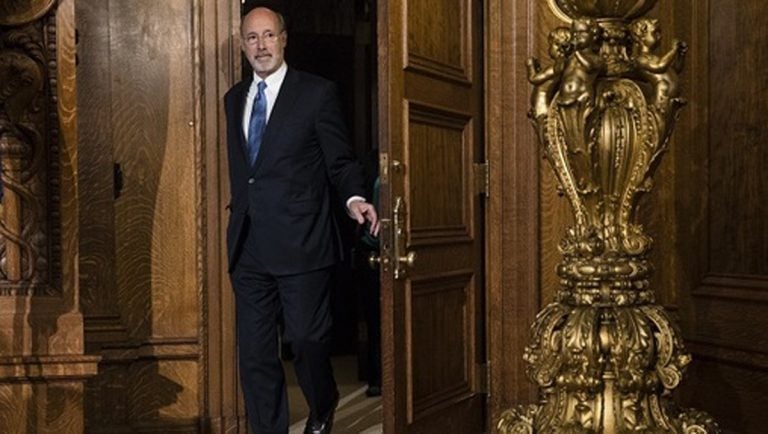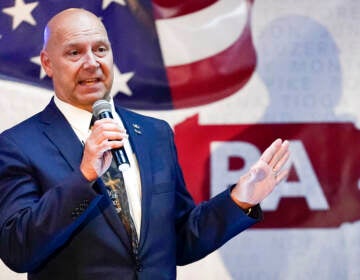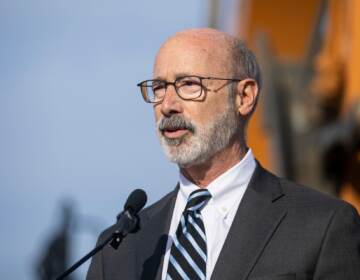Full of optimism, Gov. Wolf prepares for re-election
He sees better days ahead for Pa.'s finances.

Pa. Gov. Tom Wolf (AP, file)
Just in time for his re-election campaign, Democratic Gov. Tom Wolf is perhaps the most optimistic person in Pennsylvania.
He sees better days ahead for the state’s finances, says he’s satisfied with his first-term progress and shows no frustration over battling the huge Republican majorities that control the Legislature.
Four weeks before he releases his fourth and final first-term budget plan, Wolf seems to see state government’s post-recession deficits in the rear-view mirror and touted his work across the political aisle.
In an interview with The Associated Press, Wolf did not foresee needing a budget-balancing tax increase in a second term.
“What deficit would I be filling with a tax increase?” he questioned Tuesday.
Negotiating budgets under Wolf has absorbed an inordinate amount of time and energy over the past three years, including two protracted partisan stalemates over how to deal with massive deficits.
Wolf remains less than halfway to his original goal of a $2 billion education funding increase, but having won enough new money for schools that Wolf says districts struggling the most under the state’s 2011 cuts in aid are doing better.
Wolf also has not achieved a major first-term aim to overhaul Pennsylvania’s heavy reliance on property taxes to fund schools, seen as a driving force behind inequities between wealthy and poorer school districts.
But Wolf does not discount that he has the ability to accomplish it eventually with a Republican-controlled Legislature.
“I believe that we can continue to work together,” Wolf said. “Obviously it would be easier if I had a little more help from the Legislature, but I’m very proud of what I’ve been able to do, given what I’ve got.”
When he took office three years ago, Wolf inherited a projected multibillion-dollar deficit and he floated a multibillion-dollar tax increase, the first of three straight annual increases he proposed, each $1 billion or more.
Republican lawmakers rejected much of it. Eventually, they approved a grab-bag tax package, anchored by a cigarette tax increase, of roughly $1 billion a year.
Meanwhile, Wolf bowed to Republican plans for an aggressive expansion of casino-style gambling and a host of one-time budgeting maneuvers, including borrowing $1.5 billion to backfill Pennsylvania’s biggest cash shortfall since the recession.
It is the most money in memory the state has borrowed to finance operations, current and former state officials say.
While it wasn’t Wolf’s idea, he still defends the state’s current fiscal condition.
“Pennsylvania is now on a very solid financial foundation in a way that it wasn’t just two-and-a-half, three years ago,” Wolf said.
When Wolf arrived in 2015, he inherited what he has repeatedly hammered as “smoke and mirrors” budgeting and “kicking the can down the road.”
Independent analysts suggest Pennsylvania’s finances are still riddled with the sort of budget gimmickry that Wolf has criticized — something that Wolf rejects — and see a more immediate deficit than does Wolf’s administration.
Pennsylvania’s future finances are also rife with risk: its borrowing and Medicaid costs are growing, its population is aging quickly and its economy is expected to expand more slowly than the national average.
Still, Wolf’s administration has had the good fortune to see slowing increases in pension obligations, a shrinking prison population and smaller-than-expected increases in Medicaid costs.
It has squeezed out savings by closing a prison and reducing personnel across state agencies, while scrounging enough cash to give a big increase to programs for the intellectually disabled and launch an effort under Medicaid to care for the elderly in their homes, rather than nursing facilities.
When he presents his fourth budget Feb. 3, Wolf will propose a tax increase on Marcellus Shale natural gas production for a fourth straight year. Securing its passage — a prominent 2014 campaign theme — is what Wolf calls his biggest first-term challenge and a matter of fairness, rather than fiscal necessity.
Republicans who are lining up to challenge Wolf’s re-election bid in November will criticize his push for tax increases.
Wolf said he will run on a record of bipartisan accomplishments.
“What I’m going to run on is actually delivering on a number of things that I said I was doing to do,” Wolf said. “And yes, I didn’t do it with a Democratic House or a Democratic Senate. I did it with an overwhelming Republican General Assembly. And yet I’ve gotten things done.”
Follow Marc Levy on Twitter at www.twitter.com/timelywriter. His work can be found at https://apnews.com/search/marc_levy
WHYY is your source for fact-based, in-depth journalism and information. As a nonprofit organization, we rely on financial support from readers like you. Please give today.




